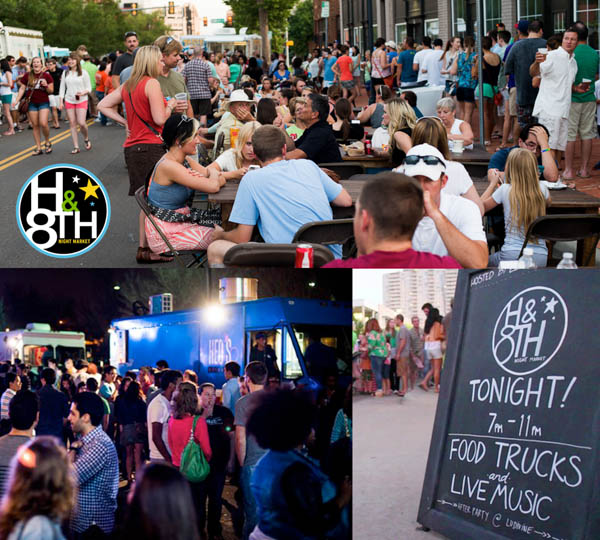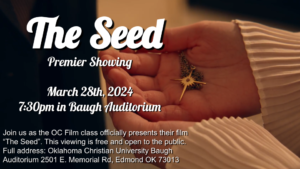Photo by: Abby Bellow
In an effort to get the Oklahoma City community moving and involved, festivals have started cropping up across the city to foster a community of arts, food and music.
The inaugural Open Streets festival on March 31 drew nearly 20,000 locals to a car-free corridor of NW 23rd St. the event focused on showcasing local businesses and emphasizing health and wellness for citizens.
“These festivals have greatly helped revive OKC’s social atmosphere for the better,” senior Mark Street said. “[They] have poured some much-needed money and vibrance into the downtown area.”
The Hudson and 8th St. Night Market, known in the community as H&8th, is a foodie festival held every last Friday of the month from March to September. H&8th showcases the city’s food truck culture and its latest up-and-coming musicians for a night of food and fun.
“I think that’s a great way to get to know the heart of your city,” junior Lauren Smith said. “If you don’t know any of the businesspeople that are the backbone of your city, you don’t really know what’s going on. I think it’s a great way to not only support some of the smaller businesses, but also to get out there and really know what’s going on around you.”
Smith recognized the importance of taking advantage of opportunities to get involved in the community, especially as a college student in a new city.
“I think these events create a lot of awareness as to what is actually going on in the city,” Smith said. “If you’re naive to what’s around you, you don’t get the full experience.”
Street shared a similar outlook on the events.
“What draws me personally to festivals like this is that I feel like I’m actually a part of the unique Oklahoma City community,” Street said. “I feel like I can contribute to the local organizations and cultures here.”
The community aspect tends to be a major draw for these festivals.
“It’s almost like an open house,” senior Ben Meaders said. “If you are trying to be the house on your street where all your kid’s friends feel like they should be welcome, or you want to be the place where people hang out, you’re going to throw a party. That’s what these people are doing. That’s what H&8th is – they’re trying to build that community, that idea that this is a cool place to be.”
The monthly Live on the Plaza festival, held in the 16th St. Arts District, is known for the attempt to revitalize a previously rundown section of Oklahoma City. This event fosters support for the arts and for local foodies, and also encourages a citywide community.
“The most positive impact of these festivals is [that they bring] people into lesser-known OKC districts and allow local businesses and organizations to thrive,” Street said.
Meaders, a native of Portland, noted similarities between the Oklahoma City district festivals and his hometown events.
“It’s been awesome to watch the different parts of OKC grow to have their own identity,” Meaders said. “I used to look at the city and think, ‘What draws people to this?’ More and more, though, it’s started to look like home. I go down to the Plaza and I’m like, ‘This could be the Hawthorne.’ It’s not that different.”
The revitalization of these areas, initiated by groups like the Uptown 23rd District Association, has primarily focused on bringing in small businesses and fostering a sense of community in place of rundown buildings and dangerous streets.
An article from The Oklahoman, “Oklahoma City crowds fill Midtown, festivals seeking fun on foot” noted the upward movement of the NW 23rd district from its earlier status as a “breeding ground for crime that provided little incentive for business or community interaction” into a district that is “experiencing the kind of cultural growth the entire city should be proud of.”
Many districts are also experiencing economic growth.
“In the near term, these events can result in a spike in revenue because they bring a lot of people together to produce a lot of business in a short amount of time,” Professor of Marketing and Management Burt Smith said. “In the longer term, if new customer relationships built at an event can be maintained, then the payoff is many times greater – benefitting the businesses which in turn benefits the city. A huge potential benefit, though it’s sometimes difficult to precisely measure, is how events like this can help build positive associations to the brand of the community and the whole city in which that community is located.”
Smith noted that although these events offer several benefits to the city, there are potential drawbacks.
“Sometimes big events can create major problems,” Smith said. “There can be traffic issues, parking problems, crowd control problems, the businesses can encounter problems in ordering too much or not enough inventory; there are any number of things to consider. Crime, which can happen anywhere, not just in an economically depressed area, is another problem that has to be considered. And if anything unfortunate happens at the event to draw negative press, it could overshadow anything positive the event is trying to accomplish. Sometimes the expectations of events like this don’t match the expectations of the customers or those who are putting it on, which can be discouraging.”
Street highlighted the importance of businesses putting up shop in districts like NW 23rd and 16th.
“The only real negative effect is that the events bring many people into the district, but then the people leave,” Street said. “To make more of a lasting impact in some of these areas, more companies like Big Truck Tacos have to be willing to take a chance and put up shop in those districts.”
Smith had a final piece of encouragement to offer fellow students.
“Don’t be an uncultured swine,” Smith said. “Get out and do something.”
Anyone interested in experiencing one of these festivals can check out Live on the Plaza on Friday, April 11th. The theme for April is Zoinks! Get Tooned and festivities will be happening Friday night from 7 until 11.














Be First to Comment